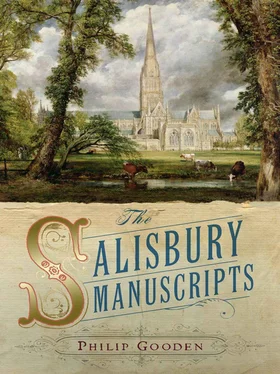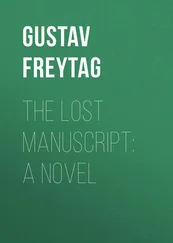Philip Gooden - The Salisbury Manuscript
Здесь есть возможность читать онлайн «Philip Gooden - The Salisbury Manuscript» весь текст электронной книги совершенно бесплатно (целиком полную версию без сокращений). В некоторых случаях можно слушать аудио, скачать через торрент в формате fb2 и присутствует краткое содержание. Год выпуска: 2009, Издательство: Soho Press, Жанр: Исторический детектив, на английском языке. Описание произведения, (предисловие) а так же отзывы посетителей доступны на портале библиотеки ЛибКат.
- Название:The Salisbury Manuscript
- Автор:
- Издательство:Soho Press
- Жанр:
- Год:2009
- ISBN:нет данных
- Рейтинг книги:3 / 5. Голосов: 1
-
Избранное:Добавить в избранное
- Отзывы:
-
Ваша оценка:
- 60
- 1
- 2
- 3
- 4
- 5
The Salisbury Manuscript: краткое содержание, описание и аннотация
Предлагаем к чтению аннотацию, описание, краткое содержание или предисловие (зависит от того, что написал сам автор книги «The Salisbury Manuscript»). Если вы не нашли необходимую информацию о книге — напишите в комментариях, мы постараемся отыскать её.
The Salisbury Manuscript — читать онлайн бесплатно полную книгу (весь текст) целиком
Ниже представлен текст книги, разбитый по страницам. Система сохранения места последней прочитанной страницы, позволяет с удобством читать онлайн бесплатно книгу «The Salisbury Manuscript», без необходимости каждый раз заново искать на чём Вы остановились. Поставьте закладку, и сможете в любой момент перейти на страницу, на которой закончили чтение.
Интервал:
Закладка:
This was Amelia Slater again. She carefully placed her soup spoon in her empty dish. ‘Don’t let’s talk of murder,’ said her husband and Tom felt faintly rebuked.
‘The case which is occupying everybody at the moment is the Tichborne Claimant,’ he said quickly.
‘Ah, the Claimant,’ said Walter.
‘I do not understand the Claimant,’ said Mrs Slater. ‘I do not read the papers. Maybe Mr Ansell could explain the Claimant to me. You are in the law, Mr Ansell, so you know everything.’
The Claimant was safe ground. Everybody had a view — except apparently Amelia Slater — and no one would really be affected by the outcome of the case. So during the main course (cold meat from the previous day, potatoes), Tom gave an outline of the court action that was gripping London and the rest of the kingdom: how Sir Roger Tichborne, heir to a great estate in Hampshire, had been reported drowned nearly twenty years ago off the coast of Brazil; how a man from Australia had come to England in 1866 to lay claim to the inheritance, saying that he was Sir Roger; how the case had wound its way through the courts for several years before it fell apart because the Claimant couldn’t show the tattoos which Sir Roger was alleged to have worn. Then a second action had been launched, this time with the Claimant as defendant. A criminal one too, alleging that the Claimant had perjured himself and issued forged bonds to pay his expenses. This was still playing itself out at the High Court. Tom Ansell had talked about it with David Mackenzie. His employer had asked him whether there wasn’t still a niggling doubt over the case. Despite almost all the evidence to the contrary, perhaps the Claimant really was Sir Roger. Mrs Slater, who’d listened attentively to Tom, certainly seemed to think so.
‘It would be romantic,’ she said, ‘romantic if this man turned out to be Sir Roger after all.’
‘My dear, that has been thoroughly disproved,’ said her husband. ‘Everyone knows that, far from being Sir Roger, the fellow is a butcher from Australia by the name of Orton. He is enormously fat, to judge by his pictures, while Sir Roger was thin. He cannot speak French, a language which Sir Roger was fluent in. No, Sir Roger is long dead and buried under the waves off Brazil.’
‘But men grow fat with the years,’ said Amelia, ‘and they can change so that they are hard to recognize from how they were. People are not what they seem. Under great stress they forget what they know. Perhaps the person did speak French but now it has all slipped from his head. Whoosh!’
She gave a sweeping motion with her hand. Tom was reminded of the moment when she’d flicked at the garden door with her heel. There might have been something a touch unladylike about both gestures but there was also something attractive to them.
He’d been talking about the Claimant case so much that he was behindhand with his eating and, while he got on with his meat and potatoes, he looked from time to time at the woman across the table. She was younger than her husband but, since he looked older than he was, the gap in years was perhaps not so great. She had dark hair and mobile features, especially her mouth and her large brown eyes. He recalled that the Canon had said that his wife liked to sit in the summer-house by the river because it reminded her of home. Home? He didn’t think it was England. The woman, with her faintly accented speech and spontaneous gestures, was not quite English. Yet Amelia, as far as Tom was aware, was not a foreign name.
Over the final courses (marmalade pudding followed by cheese), the talk turned to the Church, with Felix Slater asking his nephew about St Luke’s and Mr Simpson, the vicar. Though neither Tom nor Mrs Slater had much to say on this topic, both uncle and nephew took the trouble to include them by glances and occasional comments. Felix Slater might be an upright, rigorous individual, but he had unexpected turns and corners. There was the passion for ancient artefacts, and then there was the presence of Amelia Slater. Tom found himself wondering how they’d met, the circumstances under which they had married, and so on.
Though they’d been drinking nothing stronger than water fortified with a little wine, Tom felt set up by the meal and the company. Canon Slater must have enjoyed his presence too for, as he was leaving, he told Tom to come back the next evening with the memorandum which he was to draw up. ‘And, Mr Ansell, you are most welcome to join us for supper, if you wish.’
Tom said he’d be glad to, though part of his gladness was the idea of seeing Amelia Slater again. He was curious about her and might discover more on a second visit.
Walter accompanied him out of Venn House, explaining that he was returning to town for an evening service at his church. Mrs Slater also came to the door. She said goodbye to Tom and to Walter. She said goodbye to Walter warmly, putting her arm about him and kissing him as though he was a valued visitor and not someone who lived in the house all the time. Tom couldn’t help noticing, since there was nothing secretive or sly about Mrs Slater’s actions.
It was by now early afternoon and though the sun still shone the air was chilly as the two men went up the West Walk. Tom pulled up his coat collar. He made some casual but complimentary comment about his hosts, Walter’s uncle and aunt.
‘My aunt?’ said Walter. ‘I never think of Amelia that way. She is not very aunt-like.’
This was the opening that Tom had perhaps been looking for. He was surprised that Walter so openly stated that Mrs Slater was not aunt-like. He said, ‘No, she is certainly not like my aunts, my mother’s sisters.’
He glanced sideways to see whether Walter was inclined to say more. The assistant curate walked with a kind of bounce in his step but stayed silent.
Tom tried again: ‘They have been married a long time, Canon and Mrs Slater?’
‘Long enough,’ said Walter, then as if he felt that this answer struck the wrong note, ‘They met in Italy, in Florence.’
‘Ah, so Mrs Slater, Amelia, is Italian.’
‘On her mother’s side. Her father was English. But she lived in Florence for many years as a child.’
And she thinks of it as home, thought Tom. She sits by the river at the bottom of the garden and remembers the much greater river which flows through the middle of Florence, whatever it is called. But Walter’s reference to an English father explained the reason for Amelia’s name, just as her many years abroad accounted for her non-Englishness.
‘I think, Mr Ansell, that if you want to know any more then you should ask my uncle or aunt .’
Walter did not seem put out by the questions but plainly the topic was closed. Looking to turn the conversation in a different direction, Tom mentioned Canon Eric Selby since they were passing the spot near the entrance to the close where Selby had given him directions.
‘I know the man,’ said Walter. ‘So does my uncle of course. But I am afraid there is a coolness on his side.’
He did not enlarge on this either. The coolness between the Canons must have been mutual, thought Tom, recalling the look of distaste which had crossed Selby’s face when he said that he was searching for Venn House. He kept quiet now while they made their way back into the heart of the town, not certain whether any subject he raised might be unwelcome. Altogether, Walter Slater seemed less cheerful and forthcoming than earlier in the day.
Only after they’d parted company and Tom was returning to The Side of Beef did it occur to him that Walter had shown no curiosity about why he was in Salisbury. Did he know that his uncle was passing over his grandfather’s memoir-book? Was he aware that he would have the responsibility of deciding what to do with it once Felix Slater was dead? In fact there was a strange aspect to Walter Slater’s situation altogether. There he was, a lowly curate in a town parish, and yet he was destined to inherit a country estate. He must be a very devout man, since the Church could still be the preserve of younger sons without prospects. And what about Amelia Slater? How much did she know, beyond the fact that Tom was a representative of her husband’s lawyers?
Читать дальшеИнтервал:
Закладка:
Похожие книги на «The Salisbury Manuscript»
Представляем Вашему вниманию похожие книги на «The Salisbury Manuscript» списком для выбора. Мы отобрали схожую по названию и смыслу литературу в надежде предоставить читателям больше вариантов отыскать новые, интересные, ещё непрочитанные произведения.
Обсуждение, отзывы о книге «The Salisbury Manuscript» и просто собственные мнения читателей. Оставьте ваши комментарии, напишите, что Вы думаете о произведении, его смысле или главных героях. Укажите что конкретно понравилось, а что нет, и почему Вы так считаете.












